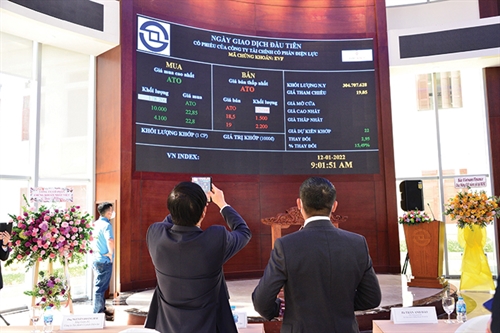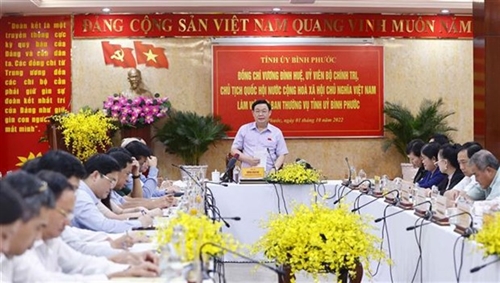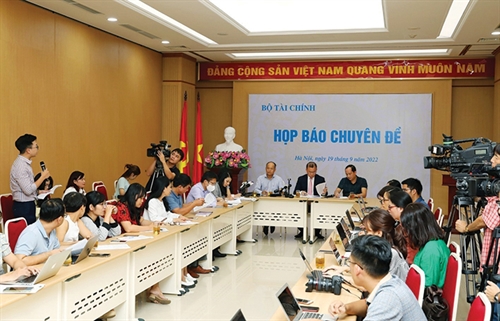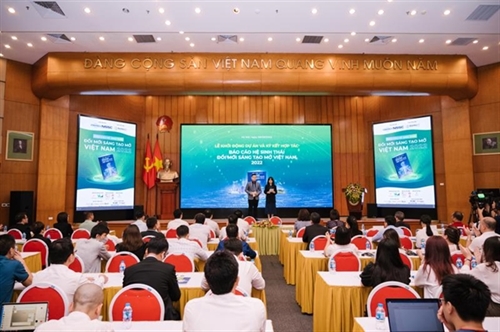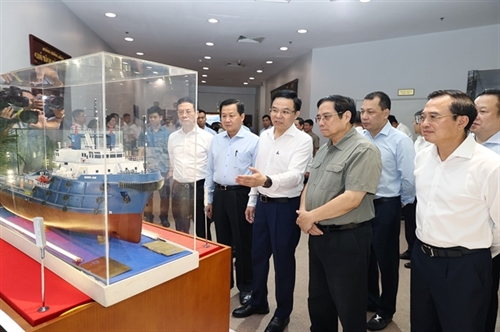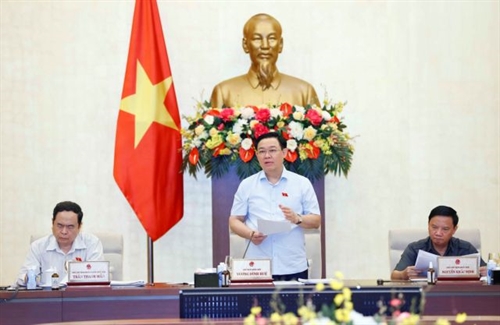Dr. Giang Bui Duc[1]
Hanoi School of Business and Management (HSB)
Vietnam National University, Hanoi
Company meetings constitute an important part of a company’s life. Failure to comply with legal requirements regarding the conduct of meetings may result in resolutions passed during those meetings being set aside[2] and this is in practice a great matter of concern. This article focuses only on meetings of the Members’ Council of multiple-member limited liability companies (LLCs) and meetings of the General Assembly of Shareholders and Board of Directors of joint-stock companies (JSCs) (or shareholding companies).
General
The purpose of company meetings is to enable members or shareholders to attend in person, and discuss and vote on matters that affect the company. Although the director or general director and legal representative of a company manage the general running of the company, certain key decisions such as amending the charter, reducing the share capital of the company, and approving large value contracts must be made by the members or shareholders. Decisions made by members or shareholders are known as resolutions. They may pass resolutions at meetings or, alternatively, written resolutions.
Resolutions passed at meetings are only valid if such meetings are properly convened and conducted. Therefore, the regulations on matters such as notice, quorum and voting must be complied with.
Under Articles 59.4, 157.9 and 144.3 of Law 59/2020/QH14 on Enterprises dated June 17, 2020, as revised in 2022 (the LOE), a member of the Members’ Council or Board of Directors or a shareholder will be deemed to attend and vote at a meeting in the following cases:
- He attends and votes in person at the meeting;
- He authorizes another person to attend and vote at the meeting;
- He attends and votes at the meeting via an online conference, or by casting an electronic vote or by other electronic forms;
- He sends his voting slip to the meeting by mail, by fax or via email; or,
- He sends his voting slip by other means as stated in the charter of the company, in case of meetings of the General Assembly of Shareholders or, Board of Directors.
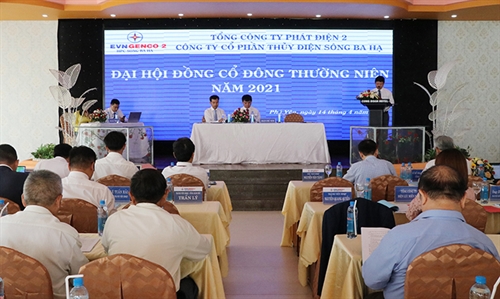 |
| The 2021 General Assembly of Shareholders of Song Ba Ha Hydropower JSC__Photo: Pham Cuong/VNA |
Meetings of the Members’ Council of a multiple-member LLC
Article 55.1 of the LOE provides that:
“The charter of the company shall make provisions on the frequency of meetings of the Members’ Council, but the Members’ Council shall meet at least once a year”.
The power to call meetings is conferred upon:
- The Chairperson of the Members’ Council (Article 57.1 of the LOE);
- A member or group of members holding 10 percent or more of the charter capital or a smaller percentage as stated in the charter of the company (Article 49.2(a) of the LOE); and
- Where a member of the company holds more than 90 percent of the charter capital and the charter of the company does not provide the right to call meetings of a group of members holding a percentage of under 10 percent, the other group of members will automatically have such right (Article 49.3 of the LOE).
Under Article 57.2 of the LOE, the Chairperson of the Members’ Council or the person convening the meeting shall prepare the agenda and documents of the meeting, and convene and chair the meeting of the Members’ Council. A member will have the right to make written additions to the agenda.
In order for a meeting to be properly constituted, the correct notice must be given and there must be a quorum of members in attendance.
The notice of invitation to a meeting of the Members’ Council may be sent in the form of a letter of invitation or by telephone, fax, electronic means or any other method as stated in the charter of the company and must be sent to each member of the Members’ Council. The notice of invitation to the meeting must specify the time, venue and agenda of the meeting (Article 57.4 of the LOE).
Under Articles 58.1 and 58.2 of the LOE:
- A meeting of the Members’ Council shall be conducted where the attending members hold at least 65 percent of the charter capital; the specific percentage is stated in the charter of the company.
- If the first meeting does not satisfy the condition to be conducted as mentioned above and the charter of the company does not otherwise state, a meeting of the Members’ Council will be convened as follows:
- Where the second meeting of the Members’ Council does not satisfy the above-mentioned condition, the notice of invitation to the third meeting must be sent within 10 days from the date on which the second meeting was intended to be conducted. The third meeting of the Members’ Council will be conducted irrespective of the number of attending members and of the amount of charter capital represented by attending members.
A member or his authorized representative must attend and vote at meetings of the Members’ Council. The procedures for conducting meetings of the Members’ Council and the voting method shall be stated in the charter of the company (Article 58.3 of the LOE).
Meetings of the Members’ Council must be recorded in minutes and may be sound-recorded or recorded and stored in other electronic forms (Article 60.1 of the LOE).
Under Article 60.2 of the LOE, minutes of each meeting of the Members’ Council must be passed immediately prior to the closing of the meeting. The minutes must contain the following main details:
- Time and venue of the meeting; purposes and agenda of the meeting;
- Full names, ratios of capital contribution, serial numbers and dates of issuance of capital contribution certificates of members or their authorized representatives attending the meeting; full names, ratios of capital contribution, serial numbers and dates of issuance of capital contribution certificates of members or their authorized representatives not attending the meeting;
- Matters discussed and voted on; summarized opinions of members on each of the matters discussed;
- Total number of valid votes, total number of invalid votes; and total number of votes for, against or abstentions on each matter voted on;
- Decisions passed and corresponding percentage of votes;
- Full names, signatures and opinions of the attendees disagreeing to pass the minutes of the meeting (if any); and,
- Full names and signatures of the person writing the minutes and the chairperson of the meeting.
Meetings of the General Assembly of Shareholders
The General Assembly of Shareholders of a JSC will convene annual meetings once a year. In addition to annual meetings, the General Assembly of shareholders may convene extraordinary meetings. The venue of a meeting of the General Assembly of Shareholders will be determined as the location where the chairperson attends the meeting and must be in the territory of Vietnam (Article 139.1 of the LOE).
The General Assembly of Shareholders must hold its annual meeting within four months after the end of a fiscal year. Unless otherwise stated in the charter of the company, the Board of Directors may extend the time limit for holding an annual meeting of the General Assembly of Shareholders where necessary, but not beyond six months after the end of the fiscal year (Article 139.2 of the LOE).
The Board of Directors shall convene annual and extraordinary meetings of the General Assembly of Shareholders (Article 140.1 of the LOE). The Inspection Committee may call an extraordinary meeting in some circumstances and if it fails to do so, shareholders holding at least 5 percent of the total ordinary shares in the company or another smaller percentage stated in the charter may call the meeting (Articles 140.2, 140.3 and 140.4 of the LOE). They may recover their expenses of doing so from the company (Article 140.6 of the LOE).
The convenor of a meeting of the General Assembly of Shareholders will prepare the agenda and contents of the meeting and shareholders holding at least 5 percent of the total ordinary shares in the company or another smaller percentage stated in the charter may suggest additional contents to the agenda (Articles 142.1 and 142.2 of the LOE).
Notice of meetings must be sent to every member no later than 21 days prior to the date of opening, unless the charter states a longer time limit. A letter of invitation must contain the name, head office address, enterprise identification number, name and contact address of the shareholder, time and venue of the meeting, and other requirements applicable to attendees (Article 143.1 of the LOE).
Letters of invitation to the meeting must be sent by a method that guarantees successful delivery to contact addresses of shareholders and must be published on the website of the company. If the company finds it necessary, the invitation will be published in a central or local daily newspaper in accordance with the charter of the company (Article 143.2 of the LOE).
An institutional shareholder or its authorized representative may attend a meeting or authorize in writing one or several other entities or individuals to attend a meeting (Article 144.1 of the LOE).
The number of persons necessary for a quorum is provided in Article 145 of the LOE as follows:
“1. A meeting of the General Assembly of Shareholders shall be conducted where the number of attending shareholders represents more than fifty (50) percent of the total number of voting shares. The specific percentage shall be stated in the charter of the company.
2. Where a meeting cannot be conducted for the first time because the condition specified in Clause 1 of this Article is not satisfied, the invitation to the second meeting must be sent within thirty (30) days from the intended date of the first meeting, unless otherwise stated in the charter of the company. The second meeting of the General Assembly of Shareholders shall be conducted where the number of attending shareholders represents at least thirty three (33) percent of the total number of voting shares. The specific percentage shall be stated in the charter of the company.
3. Where the second meeting cannot be conducted because the condition specified in Clause 2 of this Article is not satisfied, the invitation to the third meeting must be sent within twenty (20) days from the intended date of the second meeting, unless otherwise stated in the charter of the company. The third meeting of the General Assembly of Shareholders shall be conducted irrespective of the total number of voting shares held by shareholders attending the meeting”.
The company’s charter may specify procedures for conducting and voting at a meeting of the General Assembly of Shareholders. Otherwise, default rules of Article 146 of the LOE will apply.
Under Article 150.1 of the LOE, meetings of the General Assembly of Shareholders will be minuted and may be sound-recorded or recorded and stored in other electronic forms and must contain the following details:
- Name, head office address, and enterprise identification number;
- Time and venue of the meeting of the General Assembly of Shareholders;
- Agenda and contents of the meeting;
- Full names of the chairperson and the secretary;
- Summary of developments of the meeting and of opinions stated in the General Assembly of shareholders on each matter set out in the meeting agenda;
- Number of shareholders and total number of votes of attending shareholders, and an appendix listing registered shareholders and representatives of shareholders attending the meeting with the corresponding number of shares and number of votes;
- Total number of votes for each issue voted on, specifying the method of voting, number of valid votes, number of invalid votes, number of votes for or against, and abstentions; and the corresponding percentage of the total number of votes of shareholders attending the meeting;
- Matters passed at the meeting and corresponding percentage of votes for passing; and,
- Full names and signatures of the chairperson and the secretary.
The minutes of a meeting of the General Assembly of Shareholders must be completed and approved prior to the closing of the meeting (Article 150.2 of the LOE).
Minutes must be prepared in Vietnamese and may also be in a foreign language. In the case of any difference in contents of minutes between the Vietnamese text and the foreign language text, contents the Vietnamese text prevail (Articles 150.1 and 150.4 of the LOE).
The minutes of a meeting of the General Assembly of Shareholders must be sent to all shareholders within 15 days from the closing of the meeting. The sending of the minutes may be replaced by its posting on the website of the company (Article 150.5 of the LOE).
Meetings of the Board of Directors
The Board of Directors will holds a meeting at least once every quarter and may hold extraordinary meetings (Article 157.2 of the LOE).
Under Article 157.3 of the LOE, the Chairperson of the Board of Directors will convene a meeting of the Board of Directors in the following circumstances:
- At the request of the Inspection Committee or an independent member of the Board of Directors;
- At the request of the Director or General Director or of at least five other managers;
- At the request of at least two members of the Board of Directors; or,
- In other circumstances as stated in the charter of the company.
An invitation to attend the meeting must be sent to every member of the Board of Directors and inspectors at least three working days prior to the intended date of meeting, unless otherwise stated in the charter of the company. The invitation must specify the time, venue and agenda of the meeting, and issues to be discussed and decided at the meeting. It may be sent in the form of a letter of invitation or by telephone, fax, electronic means or other methods stated in the charter of the company on the condition that it is guaranteed to reach contact addresses registered with the company (Articles 157.6 and 157.7 of the LOE).
A meeting of the Board of Directors will be conducted where at least three-quarters of the total members are in attendance. If such quorum is not reached, it will be convened for a second time within seven days from the intended date of the first meeting, except where the charter of the company states a shorter time limit. In this case, the meeting will be conducted when more than half of total members attend the meeting (Article 157.8 of the LOE).
Members must attend all meetings. A member may authorize another person to attend and vote at a meeting if the majority of members so agrees (Article 157.11 of the LOE).
Under Article 158.1 of the LOE, all meetings of the Board of Directors must be minuted and may be sound-recorded or recorded and stored in other electronic forms and must contain the following main details:
- Name and address of the head office, and enterprise identification number;
- Time and venue of the meeting;
- Purpose, program and agenda of the meeting;
- Full names of members attending the meeting or persons authorized to attend the meeting and method of attending the meeting; full names of members not attending the meeting and reasons therefor;
- Issues discussed and voted on at the meeting;
- Summary of opinions of each member attending the meeting in accordance with the sequence of development of the meeting;
- Voting results, indicating members who agree, who do not agree and who abstain from voting;
- Approved matters and corresponding percentage of votes for passing; and,
- Full names and signatures of the Chairperson and the person writing the minutes.
Minutes must be prepared in Vietnamese and may also be in a foreign language. In case of any difference in contents of the minutes between the Vietnamese text and the foreign language text, contents in the Vietnamese text prevail (Articles 158.1 and 158.5 of the LOE).
Resolutions
General
The percentage of members or shareholders needed to agree to pass any resolution depends on the type of resolution to be passed. There are two major types of resolutions: ordinary resolutions and special resolutions. Decisions will be made under ordinary resolutions unless either the LOE or the charter requires that they must be made under special resolutions.
Resolutions must be passed by voting at a meeting.
In case of a multiple-member LLC, Article 59.2 of the LOE provides:
“Unless otherwise stated in the charter of the company, resolutions and decisions on the following issues must be passed by method of voting at meetings of the Members’ Council:
a/ Amendments or supplements to the charter of the company;
b/ Decisions on the developmental directions of the company;
c/ Election, removal from office or discharge of the Chairperson of the Members’ Council; appointment, removal from office or discharge of the Director or General Director;
d/ Approval of annual financial statements; and,
dd/ Reorganization or dissolution of the company”.
Article 147.2 of the LOE stipulates:
“Unless otherwise stated in the charter of the company, a resolution of the General Assembly of Shareholders on the following matters must be passed by method of voting at a meeting of the General Assembly of Shareholders:
a/ Amendments or supplements to contents of the charter of the company;
b/ Developmental directions of the company;
c/ Classes of shares and total number of shares of each class;
d/ Election, removal from office or discharge of members of the Board of Directors and Inspection Committee;
dd/Decision on any investment or sale of assets valued at thirty five (35) or more percent of the total asset value recorded in the most recent financial statement of the company, except where the charter of the company state some other percentages or value;
e/ Approval of annual financial statements;
g/ Reorganization or dissolution of the company”.
Ordinary resolutions
An ordinary resolution is one that is passed (i) by members in attendance possessing at least 65 percent (or a higher percentage stated in the charter) of the aggregate contributed capital of all attending members in case of a meeting of the Members’ Council (Article 59.3(a) of the LOE), or (ii) by shareholders possessing more than 50 percent of the total voting shares held by attending shareholders (a specific percentage must be stated in the charter) in case of a meeting of a JSC (Article 148.2 of the LOE).
Ordinary resolutions are used for the more routine decisions while special resolutions are key or sensitive ones.
Special resolutions
A special resolution is:
- In case of a meeting of the Members’ Council, a resolution passed by a majority of at least 75 percent (or a higher percentage stated in the charter) of the aggregate contributed capital of all attending members with respect to the sale of assets valued at 50 percent or more of the total asset value recorded in the most recent financial statement of the company, or a smaller percentage or value as stated in the charter of the company, or amendments or supplements to the charter of the company, or reorganization or dissolution of the company (Article 59.3(b) of the LOE).
- In case of a JSC:
- A resolution that results in an adverse change of rights and obligations of a preference shareholder may only be passed if it is agreed by the number of attending preference shareholders of the same type owning 75 percent or more of the total preference shares of such type (Article 148.6 of the LOE).
- A resolution passed by the method of cumulative voting (Article 148.3 of the LOE).
Written resolutions
The Members’ Council of a multiple-member LLC or the General Assembly of Shareholders may pass any decision by a written resolution, in addition to resolutions that must be passed by voting at a meeting as mentioned above.
Where a written resolution is proposed, a copy of the resolution must be sent to every member or eligible shareholder (Articles 61.2 and 149.2 of the LOE).
A resolution of the Members’ Council of a multiple-member LCC may be passed if it is agreed by members holding 65 percent or more of the charter capital; the specific percentage is stated in the charter of the company (Article 59.5 of the LOE).
In case of a meeting of the General Assembly of Shareholders:
- A resolution of the General Assembly of Shareholders may be passed when it is agreed by attending shareholders holding more than 50 percent of the total voting shares. The specific percentage is stated in the charter of the company (Article 148.4 of the LOE);
- A resolution of the General Assembly of shareholders resulting in an adverse change of rights and obligations of a preference shareholder may only passed if it is agreed by the preference shareholders of the same type owning 75 percent or more of the total preference shares of such type (Article 148.6 of the LOE).
The Board of Directors will pass resolutions and decisions by method of voting at a meeting, collecting written opinions or otherwise as stated in the charter of the company. Each member has one vote (Article 153.3 of the LOE).
Except where the charter of the company provides for some higher percentages, a resolution or decision of the Board of Directors may be passed when it is agreed by the majority of the members in attendance. In case of a tied vote, the final decision shall be made in favor of the vote of its Chairperson (Article 157.12 of the LOE).
The LOE does not indicate the percentage of votes required to pass a resolution by the method of collection of written opinions and this is a loophole of that law. The percentage necessary for resolutions to be passed by way of meeting mentioned above should be applied.
The above analysis shows that the LOE addresses various aspects of meetings of the governing bodies of a LLC or JSC. However, certain issues remain and need to be dealt with in the incoming overhaul of the law.-

